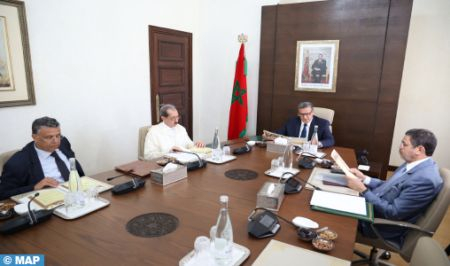Head of Government Holds Meeting As Part of Implementing Royal Letter on Family Code Revision
Head of Government, Aziz Akhannouch, held a meeting, on Wednesday at the headquarters of the Head of Government’s Department in Rabat, devoted to implementing the contents of the Royal Letter on the revision of the Family Code that HM King Mohammed VI, Commander of the Faithful, addressed to the Head of Government. The meeting was attended by Minister of Justice, Abdellatif Ouahbi, President delegate of the Higher Council of the Judicial Power, Mohammed Abdennabaoui, and the King’s Public Prosecutor at the Court of Cassation, President of the Public Prosecution, El Hassan Daki. The Royal Letter addressed to the Head of Government gives concrete form to the Royal decision announced by HM the King in the Speech of the Throne for the year 2022, and reflects the Sovereign’s constant concern to promote women’s and family issues in general. In this Royal Letter, HM the King affirms the need to revisit the Family Code, which has had the immense advantage of stimulating a virtuous dynamic of change and establishing a new conception of equality and family balance, thus paving the way for considerable social progress, in order to overcome the inadequacies and imbalances that the experience of its judicial implementation has revealed. The Sovereign stresses that the provisions of the Family Code must be “consistent with the evolution of Moroccan society and the requirements of sustainable development,” noting that the new version will be thus “compatible with the progress made in our national legislation”. “The desired upgrading of the Family Law must be based on the key principles and main orientations underpinning the law’s preparation, and which I set out in the speech I delivered before Parliament on 10 October 2003. These principles were reaffirmed in the State of the Nation address on 30 July 2022,” emphasizes HM the king. In this regard, the Sovereign notes: “I am keen to ensure the amendment of the Family Law is in keeping with the purposes of the Islamic Sharia and the specificities of Moroccan society,” adding that “the virtues of moderation, open-minded ijtihad, consultation and dialogue should be observed, and the various institutions and stakeholders concerned ought to be involved”. Therefore, adds HM the King, “the desired revisiting of the law must be limited to fixing the imbalances revealed over nearly twenty years by the implementation of the text from a judicial perspective, as well as to amending the provisions that have become outdated given the development of Moroccan society and of our national legislation”. His Majesty the King underlines that the amended Code should retain the same reference frame and the main rationale, namely the principles of justice, equality, solidarity and harmony stemming from the pristine Islamic faith, as well as the universal values underpinning the international agreements ratified by Morocco. “I am confident that sound, constructive reasoning is the proper way to strike a balance between the Islamic frame of reference and its purposes on the one hand, and the internationally agreed rights developments on the other,” stresses the Sovereign. “As I have emphasized on several occasions, I cannot, as Commander of the Faithful, allow what Almighty God has proscribed, nor forbid what He has permitted,” HM the king points out. Considering the key legal and judicial dimensions involved, the Sovereign notes, “I have decided to entrust the joint and collective supervision of the amendment process to the Ministry of Justice, the Higher Council of the Judicial Power, and the Presidency of Public Prosecution”. In this regard, the Sovereign calls on these institutions to closely involve other bodies directly concerned by this question, particularly the Higher Ulema Council, the National Human Rights Council, and the government authority in charge of solidarity, social inclusion and the family, emphasizing the importance of opening up to a broad spectrum of civil society organizations and groups as part of a participatory approach. HM the king affirms that the changes and amendments proposed should take into account the outcomes of the extensive consultations and hearings that will take place, in particular those involving civil society organizations concerned with human rights and the rights of women and children, as well as judges, university researchers and other parties concerned with family law matters. “I expect the outcomes of these meetings and consultations to be drafted in the form of proposed amendments to be submitted to me in my capacity as Commander of the Faithful and guarantor of the citizens’ rights and freedoms, within a period of six months at the most. The proposed amendments are to be submitted to me prior to the preparation of the final version that will be presented to Parliament for adoption,” stresses the Sovereign. In a statement to the press after the meeting, Akhannouch said he was honored to receive this Royal Letter, which inaugurates the process of revisiting the Family Code, this major reform project overseen by His Majesty the King, may God glorify Him. The Royal Letter specified the party that will steer the reform operation, made up of the Ministry of Justice, the High Council of the Judicial Power and the Presidency of Public Prosecution, as well as the working methodology based on listening according to a participatory approach, in addition to a six-month period as the maximum deadline for accomplishing this mission, he said. The Head of Government underlined that, as part of the implementation of the contents of the Royal Letter, it had been decided to hold a meeting early next week, which would be followed by meetings to listen to all the components of Moroccan society concerned by this issue. He pointed out that this reform represents a high point for Morocco, expressing the hope that all stakeholders will make a positive contribution to it, as desired by His Majesty the King, Commander of the Faithful.

